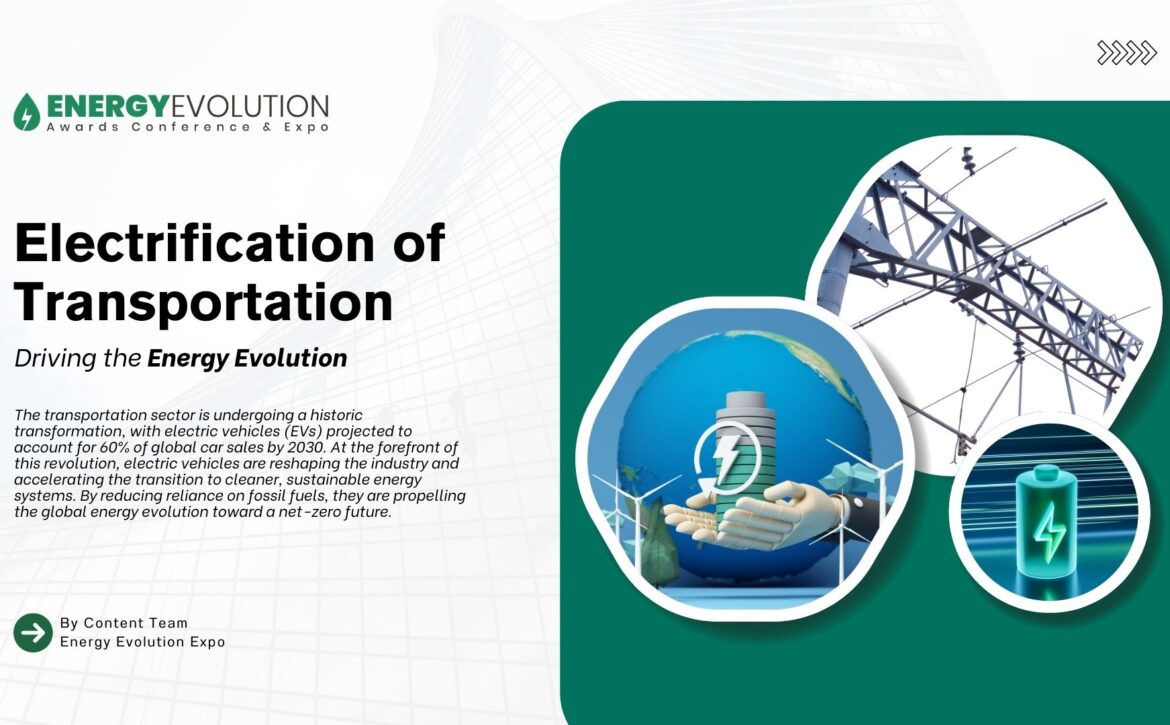Electrification of Transportation: Driving the Energy Evolution
The transportation sector is undergoing a historic transformation, with electric vehicles (EVs) projected to account for 60% of global car sales by 2030. At the forefront of this revolution, electric vehicles are reshaping the industry and accelerating the transition to cleaner, sustainable energy systems. By reducing reliance on fossil fuels, they are propelling the global energy evolution toward a net-zero future.
Why Electrification Matters
Transportation accounts for 15% of global greenhouse gas emissions. Replacing internal combustion engines with EVs could reduce CO₂ emissions by 1.5 gigatons annually by 2030, according to the International Energy Agency (IEA).
Example: Norway leads the way, with over 80% of new cars sold in 2023 being electric.
Electric Vehicles are 3-4 times more energy-efficient than traditional gasoline-powered vehicles. For every unit of energy, EVs can convert 77% to movement, while internal combustion engines achieve only 20-30% efficiency.
Integration with Renewables
Countries like Iceland and Costa Rica, with nearly 100% renewable electricity grids, are demonstrating how EVs can run entirely on clean energy.
Key Statistics: Global Electric Vehicle (EV) Market
The global EV fleet has experienced remarkable growth, exceeding 26 million vehicles in 2023, according to the International Energy Agency (IEA). This expansion highlights:
In 2023, EV sales surged by 35%, totaling over 14 million units sold worldwide.
A projected market value of $1.1 trillion by 2030, representing a significant surge from $250 billion in 2022.
Technological breakthroughs are playing a pivotal role in boosting EV adoption across the globe.
Game-Changing Innovations Driving EV Adoption
Companies like Tesla and CATL are pushing boundaries with solid-state batteries offering 500 miles of range on a single charge.
The number of global EV charging stations reached 2.7 million in 2023, up from just 2.1 million in 2022 (IEA).
Example: India’s ambitious goal is to install 46,000 EV chargers along highways by 2025.
China operates the largest fleet of electric buses globally, with 420,000 electric buses as of 2023.
Overcoming Key Challenges in Electric Vehicle Adoption
As the world transitions to electric vehicles (EVs), several roadblocks must be addressed to ensure a seamless and sustainable adoption process. Three primary challenges include:
1. Infrastructure Development
In the United States, approximately 50% of EV owners encounter difficulties in locating nearby charging stations. Initiatives like the National Electric Vehicle Infrastructure (NEVI) program aim to bridge this gap by promoting the development of a comprehensive and convenient charging network.
2. Resource Availability
The escalating demand for lithium, driven by the growing adoption of EVs and renewable energy storage solutions, poses a significant challenge. In the United States, lithium demand is projected to surge by nearly 500% by 2030, reaching approximately 412,000 tonnes of lithium carbonate equivalent (Fastmarkets).
To mitigate this, companies like Tesla and innovative startups are exploring alternative battery technologies, such as sodium-ion batteries, to reduce dependence on lithium.
3. Grid Stability
The widespread adoption of EVs is expected to increase global electricity demand by 6% by 2040, necessitating upgrades to power grids to ensure stability and efficiency.
Electrifying Transportation at All Levels
Freight: Electric trucks like the Tesla Semi are revolutionizing freight transport, with 500 miles of range and operational cost reductions of 20% compared to diesel trucks.
Aviation: Companies like Eviation are developing all-electric airplanes, with the Alice aircraft achieving its maiden flight in 2022.
Shipping: The world’s first electric cargo ship, the Yara Birkeland, is already operational in Norway, reducing emissions from shipping.
Conclusion: Shaping a Greener Future
The electrification of transportation is more than a technological shift; it’s a movement toward a sustainable, net-zero future. By embracing innovation, cutting emissions, and advancing energy-efficient solutions, EVs are driving the energy evolution. Together, we can ensure a cleaner and greener planet for generations to come.
Global initiatives like the Energy Evolution Expo 2025 are paving the way for advancements in electrification and sustainable energy.
Energy Evolution Expo 2025: Powering a Sustainable Future
The Energy Evolution Expo 2025, taking place from March 13–14 at the Crowne Plaza Madrid Airport, Spain, will spotlight electrification as a driving force in transforming global energy systems. The event will explore critical topics like EV advancements, battery technology, and the integration of renewables with electric vehicles. Attendees will gain insights into innovations in charging infrastructure and energy efficiency that are shaping the future of sustainable transportation.


